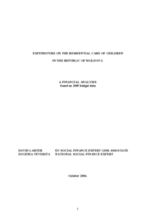This report analyses and comments upon the expenditures from public funds on the residential care of children in the Republic of Moldova for the financial year 2005. The analysis uses outturn data for 2005 supplied by the Ministry of Education Youth and Sport, the Ministry of Health and Social Protection.
Overall the analysis of expenditures reveals a system of residential care that is:
- costly;
- poorly managed;
- follows no consistent policies;
- whose terms of reference are widely abused (21% of all children are day pupils and should not be attending residential schools); and
- which occupies real estate which is costly to maintain and poorly maintained.
The system of residential care bleeds resources away from communities in order to provide high cost and ineffective services to only 1.5% of the child population. Leaving aside social or moral considerations, this concentration of resources cannot be justified on financial grounds. The very large amount of donations to the residential care sector deprives communities and community services of a greater opportunity to benefit from donor generosity.
Based upon the evidence presented in the published financial data, a reform programme for residential care in the Republic of Moldova should assume closure of institutions as its primary objective, redeploying resources into new or improved community services on alternative sites, retaining or redeveloping existing facilities only when there is an overwhelming case for their retention and reuse.
The future sustainability of the revised child protection system depends almost exclusively on the release of resources from the residential sector. A reform programme must be based upon a detailed, institution by institution evaluation. Any proposal or hypothesis which preallocates any given institution to a particular future without a detailed examination (particularly of the relationship between the hypothetical proposal and local community need) is cause for concern and review.

